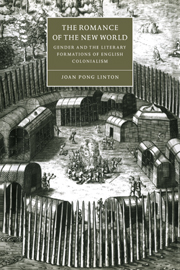Book contents
- Frontmatter
- Contents
- Acknowledgments
- Introduction
- 1 Love's laborers: the busy heroes of romance and empire
- 2 Sea-knights and royal virgins: American gold and its discontents in Lodge's A Margarite of America (1596)
- 3 Jack of Newbery and Drake in California: domestic and colonial narratives of English cloth and manhood
- 4 Eros and science: the discourses of magical consumerism
- 5 Gender, savagery, tobacco: marketplaces for consumption
- 6 Inconstancy: coming to Indians through Troilus and Cressida
- 7 The Tempest, “rape,” the art and smart of Virginian husbandry
- Coda: the masks of Pocahontas
- Notes
- Works cited
- Index
- Cambridge Studies in Renaissance Literature and Culture
7 - The Tempest, “rape,” the art and smart of Virginian husbandry
Published online by Cambridge University Press: 06 November 2009
- Frontmatter
- Contents
- Acknowledgments
- Introduction
- 1 Love's laborers: the busy heroes of romance and empire
- 2 Sea-knights and royal virgins: American gold and its discontents in Lodge's A Margarite of America (1596)
- 3 Jack of Newbery and Drake in California: domestic and colonial narratives of English cloth and manhood
- 4 Eros and science: the discourses of magical consumerism
- 5 Gender, savagery, tobacco: marketplaces for consumption
- 6 Inconstancy: coming to Indians through Troilus and Cressida
- 7 The Tempest, “rape,” the art and smart of Virginian husbandry
- Coda: the masks of Pocahontas
- Notes
- Works cited
- Index
- Cambridge Studies in Renaissance Literature and Culture
Summary
In The Tempest, a failed attempt by Caliban to rape Miranda constitutes the event on which a power structure is ratified. For Prospero, who has already taken over control of the island when Caliban was a child, the attempt justifies his enslavement of Caliban. Caliban disagrees: had he succeeded, he “had peopled else / This isle with Calibans” (1.2.150–51). Begetting his own lineage would have legitimized his title to the island and recast his action in a different light. The unrepentant Caliban draws an angry response from Miranda. Calling him an “abhorred slave, / Which any print of goodness wilt not take,” she reminds him that
I pitied thee,
Took pains to make thee speak, taught thee each hour
One thing or other: when thou didst not, savage,
Know thine own meaning, but wouldst gabble like
A thing most brutish, I endowed thy purposes,
With words that made them known. (1.2.353–58)
Miranda sees the failed rape as a sign of Caliban's failed education, but a more complicated picture emerges from the exchange if we notice the implied parallel between rape and education. The reference to education as “print” suggests not just a means of inscription but also a current metaphor for impregnation, the imprinting of a paternal image in the womb. In teaching Caliban her language, then, Miranda's attempt to imprint him with her cultural values and meanings (taught her solely by her father) comes to mirror his fantasy of engendering copies of himself upon her. For Caliban, then, her education of him thus operates as a form of cultural rape, to which his attempted rape of her serves as a symbolic payback.
- Type
- Chapter
- Information
- The Romance of the New WorldGender and the Literary Formations of English Colonialism, pp. 155 - 184Publisher: Cambridge University PressPrint publication year: 1998
- 1
- Cited by

